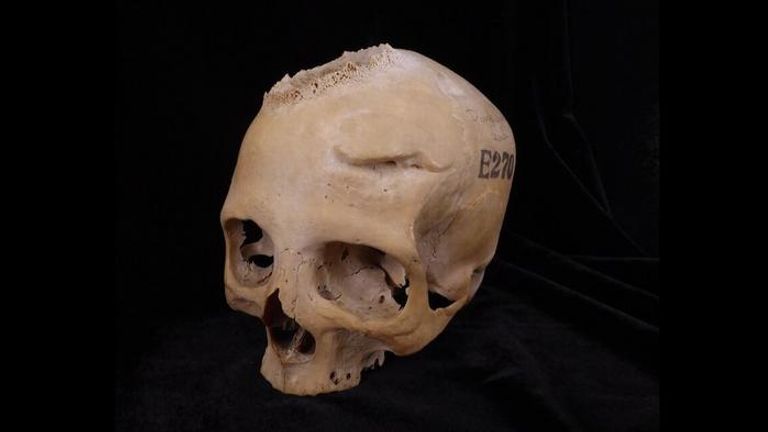Ancient Egyptians appear to have carried out surgery on people with cancerous cells, a study has found.
Scientists already knew from their texts that ancient Egyptians were exceptionally skilled with medicine – and could treat diseases, traumatic injuries, build prostheses, and put in dental fillings.
But an international team of researchers studied two human skulls, each thousands of years old, and found “extraordinary” evidence of attempts to treat cancer.
The study’s lead author, Professor Edgard Camaros, a paleopathologist at the University of Santiago de Compostela, said: “This finding is unique evidence of how ancient Egyptian medicine would have tried to deal with or explore cancer more than 4,000 years ago.
“This is an extraordinary new perspective in our understanding of the history of medicine.”
Tatiana Tondini, a researcher at the University of Tubingen and first author of the study published in Frontiers in Medicine, added: “We see that although ancient Egyptians were able to deal with complex cranial fractures, cancer was still a medical knowledge frontier.
“We wanted to learn about the role of cancer in the past, how prevalent this disease was in antiquity, and how ancient societies interacted with this pathology.”
The researchers examined two skulls held at the University of Cambridge’s Duckworth Collection, one dated between 2687 and 2345 BC belonging to a man aged between 30 and 35, and the other from between 663 and 343 BC to a woman who was older than 50.
On the male skull, microscopic observation showed a big-sized lesion consistent with excessive tissue destruction and around 30 metastasized lesions.
‘We could not believe what was in front of us’
But Ms Tondini said the researchers were stunned to discover cutmarks around those lesions, which were likely made with a sharp object such as a metal instrument.
“When we first observed the cutmarks under the microscope, we could not believe what was in front of us,” she said.
Co-author Professor Albert Isidro, a surgical oncologist at the University Hospital Sagrat Cor, who specialises in Egyptology, said: “It seems ancient Egyptians performed some kind of surgical intervention related to the presence of cancerous cells, proving that ancient Egyptian medicine was also conducting experimental treatments or medical explorations in relation to cancer.”
The female skull also featured a large lesion consistent with a cancerous tumour that led to bone destruction.
This may indicate that although modern lifestyles, people living longer and cancer-causing substances in the environment are all associated with an increased cancer risk, cancer was also common thousands of years ago.
Successful ancient treatment
One of two healed lesions from traumatic injuries on the female skull appears to have originated from a close-range violent event using a sharp weapon – meaning the woman potentially received some kind of treatment and, as a result, survived.
However, the scientists warned that the study of skeletal remains involves certain challenges that make definitive statements difficult, especially since remains often are incomplete and there is no known clinical history.
Prof Camaros concluded: “This study contributes to a changing of perspective and sets an encouraging base for future research in the field of paleo-oncology, but more studies will be needed to untangle how ancient societies dealt with cancer.”



























